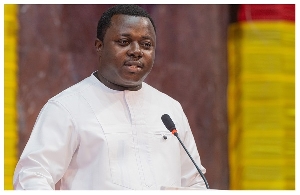 Reverend John Ntim Fordjour, Deputy Minister of Education
Reverend John Ntim Fordjour, Deputy Minister of Education
Reverend John Ntim Fordjour, a Deputy Minister of Education, says government learning interventions, in collaboration with Right to Play and other stakeholders, have improved learning outcomes at the basic level.
Rev Fordjour said the introduction of the National Standardised Test had led to an increase of 38 per cent in learners’ ability to read in primary two, compared to two per cent in 2015.
The Deputy Minister said this in Accra at a dissemination session on the impact of learning through play.
The programme was organized by the Ministry of Education in collaboration with Right To Play.
It is on the theme: "Accelerating Learning Outcomes Through Play-Based Approaches: Unlocking the Successes and Insight from Play-Based Learning Programmes in Ghana."
The Partners in Play Project is working to enhance the quality of education for girls and boys aged four to twelve years in Ghana from 2019 to 2024.
The project is incorporating play-based learning approaches into the school curriculum and teaching practices.
Rev Fordjour said the government had implemented significant education reforms to transform teaching and learning in response to persistent gaps in access and quality education in the country.
He said the government was moving away from traditional styles of teaching at all levels and demonstrating its strong commitment to evidence-based, play-based learning and other creative pedagogies.
He said midway through the project, results showed improvements in foundational literacy, increased student enrolment, and increased motivation to learn.
The project has also demonstrated positive student-teacher relationships and the creation of safe, inclusive, and nurturing learning environments.
He stressed that a lot of these learning approaches have indicated that when children are supported to learn through play, it leads to improvements in learning outcomes.
He said the Ministry intended to harmonize all the effective play-based pedagogies under one platform and get funding to scale up the interventions across the country for better outcomes.
Josephine Mukakalisa, Country Director of Right To Play, said their outfit brought technical expertise in how to incorporate play-based learning into curriculum and teaching practices.
She said under the project, Right to Play had developed Gender Responsive Education and Transformation and trained more than 4,000 teachers from 2018 to 2023, including online support for teachers during the COVID-19 lockdowns.
Madam Mukakalisa said the project had increased students' reading fluency in English by 51 words per minute from a baseline of 18 words per minute by the end of primary school.
She said Ghana was among the countries making strides in developing children's competencies, adding that play-based pedagogy opened a world of opportunities for the learners.